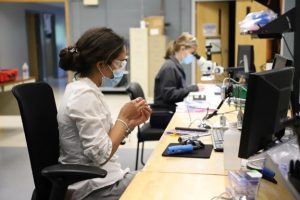By Timothy Kelly
An article published by Bloomberg in July focused on the accelerating reshoring trend in manufacturing and noted that companies aren’t just talking about reshoring — they’re taking action. Some companies are moving their supply chains, including primary production facilities, out of China and relocating to the U.S. According to the article, the construction of new factories in the United States has increased 116% since last year. Manufacturers of semiconductors, steel and aluminum are relocating to the United States as well.
Leaders from five local companies weighed in with their views. We also asked if they have experienced the effects of the reshoring trend and how they’re faring in the current economic climate. Here’s what we learned.

What are your thoughts on the Bloomberg article?
Todd Erdley, founder, chairman and president of Videon, noted, “As a country we can’t [currently] do what we need to do because all of our chip manufacturing is in Taiwan and China.” Overseas wage increases, multiplied shipping costs, geopolitical strife and labor shortages all contribute to the breakdown in the international supply chains, so it makes economic sense to eliminate those points of breakage where possible.
Maureen Mulvihill, PhD, president and CEO of Actuated Medical, Inc. added, “… With the uncertainty and backorder timelines coupled with the global surge in demand, there is an economic reason to diversify and bolster chips manufacturing in the United States.”
Gary Barone, director of engineering and business development at SilcoTek Corporation, said, “Yes, we are seeing similar onshoring, or ‘re-shoring,’ trends amongst our customer and supplier base.” Barone also said that, in his experience, large original equipment manufacturers (OEMs) “are looking for alternatives to streamline and consolidate their supply chains.”

Workers in the Actuated Medical lab. Photo provided.
What’s the state of manufacturing in Happy Valley?
Despite the challenges of current economic conditions and the Covid-19 pandemic, many Happy Valley manufacturers have remained healthy. There seem to be several reasons why they have fared well.
First, local companies responded quickly and adapted to the changes in the supply chain in 2020. They were prepared to think creatively and act decisively when facing the new challenges.
Fred Marroni, president and CEO of Indigo Biosciences, Inc., said that his firm was forced to look for products from other sources and focus on domestic suppliers. He said, “While supply chain issues created a challenge, we managed to continue to produce product to meet customer demand.”
Similarly, Erdley said about Videon, “ I’m very … proud to say we have not missed a single shipment over the last three years.”
These businesses have also maintained a commitment to the fundamentals of healthy operations throughout the last few years. Erdley said, “… here in central Pennsylvania, companies… are more focused on operating with a high level of commitment to the fundamentals… We have operational commitments here in central Pennsylvania.”
At ConidioTec, CEO Don McCandless said that maintaining cash flow has been a key piece of the organization’s success. A solid cash flow enabled ConidioTec to respond to changing demands like new, larger minimum order quantities for components and supplies.
Erdley, Marroni and McCandless also all indicated that carrying inventory, in some instances well above their organizations’ immediate needs, was important to their success over the last few years.
Erdley said, “The more that you have that vertical integration, and the more that you have great processes and great forecasting, the better you’re going to be.” McCandless added that planning, foresight and paying attention to global events helped ConidioTec weather recent storms.
Happy Valley companies’ deep tech origins
Perhaps the most fundamental factor helping Happy Valley manufacturers thrive has to do with their deep tech origins. Deep tech is defined as high-tech products or services that solve persistent or vexing technical problems by the application of novel engineering solutions and/or scientific discoveries. Many local companies started with deep tech concepts from the results of Penn State research.
Ultimately, Happy Valley’s deep tech employers may keep the local economy elevated above the national averages.
Happy Valley has a long history of successful deep tech startups. For example, State of the Art, Inc. founded in 1969, has been providing its customers with high-tech resistor products since the 1970s, almost 40 years before the phrase “deep tech” was coined in 2014.
Chip shortage may continue to be a manufacturing challenge
Mulvihill noted that “even with the significant government support, it will take many years for these chip manufacturers to begin producing products that industry needs today. We will still have supply chain issues while companies scale up production in the United States.”
Marroni echoed Mulvihill’s conclusion. “The near-term challenge will be that the facilities will take years to construct. Site identification, governmental permits, infrastructure and construction will take many years,” he said.
What does the future hold?
Erdley said the flow of money into the economy from the pandemic assistance programs and the rising stock market has artificially inflated some company positions. The pendulum is likely to swing back, leading to a correction in the economy, he said, noting “… from a global economic perspective… there was bound to be a bit of a downturn.”
He added that the sky isn’t falling, we’re just seeing a “right-sizing of… companies that needed a bit of adjustment.” The recent downward correction in the chip market seems to reinforce his assessment.
Consequences may include layoffs, wage growth being “tapped down” and more conservative business spending. Erdley also expects that “the opportunity to rapidly switch jobs will be muted to a degree.” It remains to be seen if the worker shortage will offset the potential layoffs and wage compression Erdley predicted.
Marroni noted that “the access to raw materials may turn out to be the biggest challenge in redeveloping manufacturing capabilities domestically.”
Erdley warned that business based on a landed cost, that is, the sum of expenses associated with shipping a product, of “devices, functions, whatever, from overseas … are going to be … in a tenuous position.” Shoring up the supply chain back to the United States and becoming vertically integrated would put such a business in a better position.
Russia’s war with Ukraine, China’s recent sword rattling and its real estate crisis add to the uncertainty of the economic landscape.
Ultimately, Happy Valley’s deep tech employers may keep the local economy elevated above the national averages.
How is your company adapting to supply chain disruptions? Do you have any lessons you can share? Let us know!






